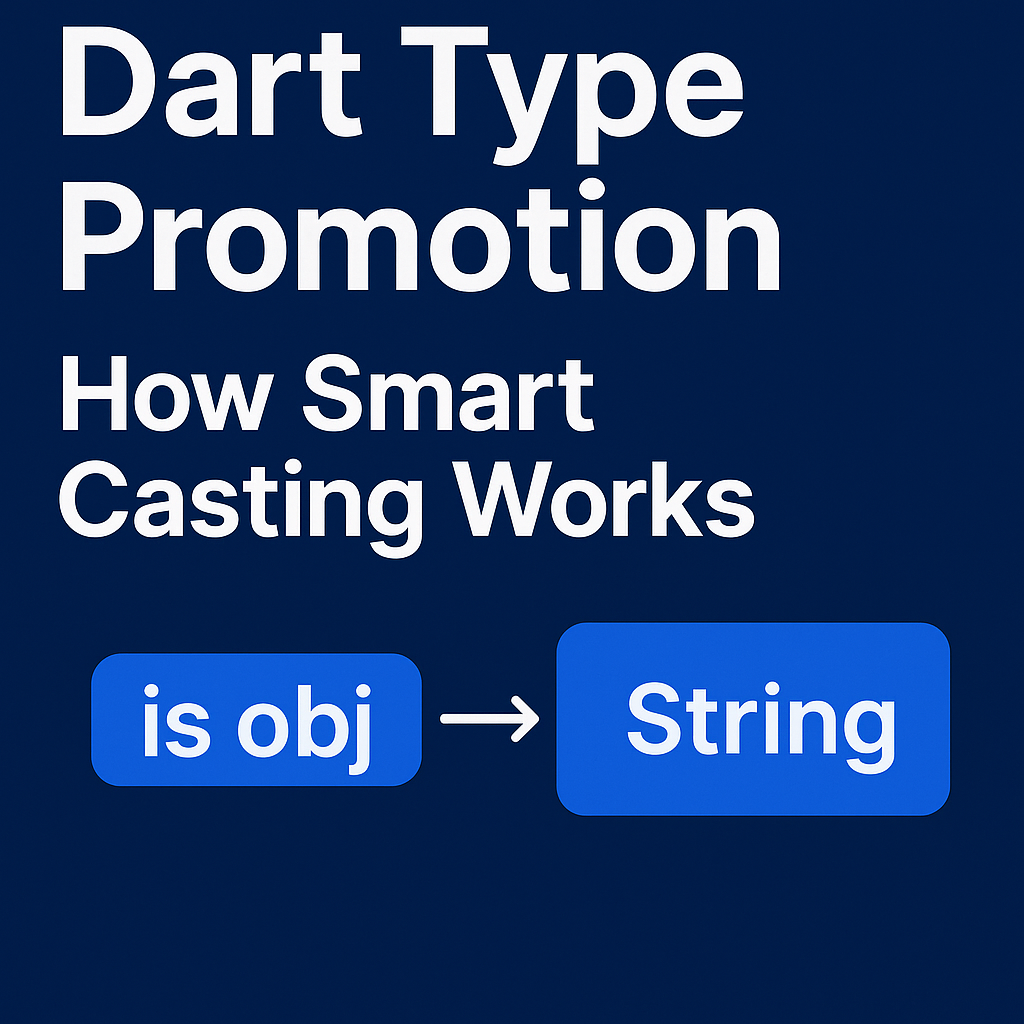Introduction
In Dart, thanks to null safety and a powerful type system, smart casting (also called type promotion) helps you write cleaner and safer code—without using explicit casts. But many developers still confuse when and how Dart promotes a variable’s type.
In this article, we’ll explore what type promotion means, how it works behind the scenes, and when it fails. Let’s dive deep into smart casting in Dart with practical, real-world examples.
What is Dart Type Promotion?
Type promotion means automatically treating a variable as a more specific type after a type check, like using is or checking nullability. It eliminates the need to write (obj as SomeType) manually every time.
Basic Example:
void printLength(Object? obj) {
if (obj is String) {
// Dart automatically promotes obj to String inside this block
print(obj.length); // no cast needed
}
}
Here, obj is of type Object? but inside the if (obj is String) block, Dart promotes it to String.
Promotion with Null Checks
Example:
void greet(String? name) {
if (name != null) {
// name is now String (non-nullable) inside this block
print("Hello, ${name.toUpperCase()}");
}
}
Dart understands name is not null inside the block, so it allows all String methods.
When Type Promotion Fails
Case 1: Variable is reassigned
void check(Object? value) {
if (value is String) {
value = 42; // type promotion fails after reassignment
print(value.length); // Compile error
}
}
Once reassigned, Dart revokes the promotion.
Case 2: Property, not local variable
class User {
Object? data;
void process() {
if (data is String) {
print(data.length); // Compile error
}
}
}
Why? Dart doesn’t promote instance fields because other code might change them.
Using as vs Smart Casting
If promotion fails, you can fallback to manual casting using as:
void show(dynamic item) {
if (item is! int) return;
print((item as int).isEven); // required if promotion fails
}
Real-Life Flutter Example
Widget with Dynamic Parameters
void handleValue(dynamic value) {
if (value is int) {
debugPrint("Value is doubled: ${value * 2}");
} else if (value is String) {
debugPrint("Length: ${value.length}");
} else {
debugPrint("Unknown type");
}
}
This pattern is useful when working with dynamic API data or deeply nested JSON.
Read Articles : How to Use Isolates for CPU-Intensive Tasks in Dart?
Best Practices
- Prefer
isand null checks for safe promotion - Avoid unnecessary
ascasts – let Dart do the work - Use final/local variables for guaranteed promotion
- For properties or fields, use a local copy to enable promotion
final localData = this.data;
if (localData is String) {
print(localData.length); // Now it works
}
FAQs – Dart Type Promotion
is keyword do in Dart? A: It checks whether a variable is of a specific type. If true, Dart automatically promotes the variable to that type within the scope.
A: Yes, Dart performs smart casting if a type check like is or a null check (!= null) passes. However, it doesn’t promote fields or variables that are reassigned.
this.x? A: Because Dart assumes such properties might be changed by other code (like another method or thread), so it avoids unsafe promotion.
as casting in Dart? A: Use as when smart promotion isn’t available or when you’re certain of the type. But be cautious—wrong usage can lead to runtime errors.
Conclusion
Dart’s smart casting system is one of the cleanest among modern languages. It helps you avoid boilerplate and write safer code—if you know how it works.
Use type promotion with confidence, and you’ll find your Dart and Flutter code becoming more elegant and bug-free.


